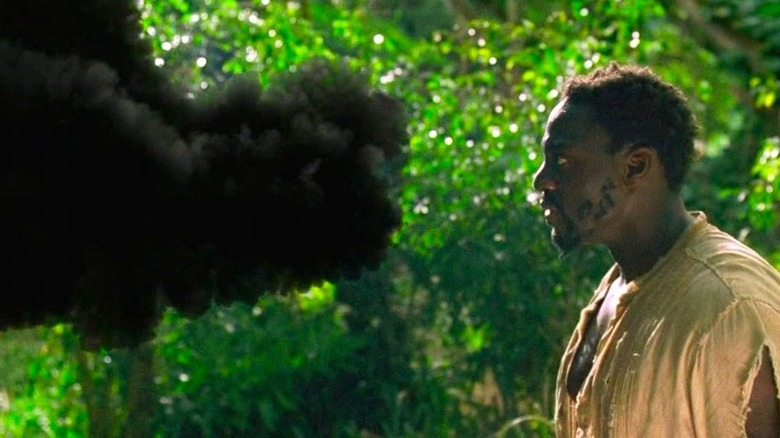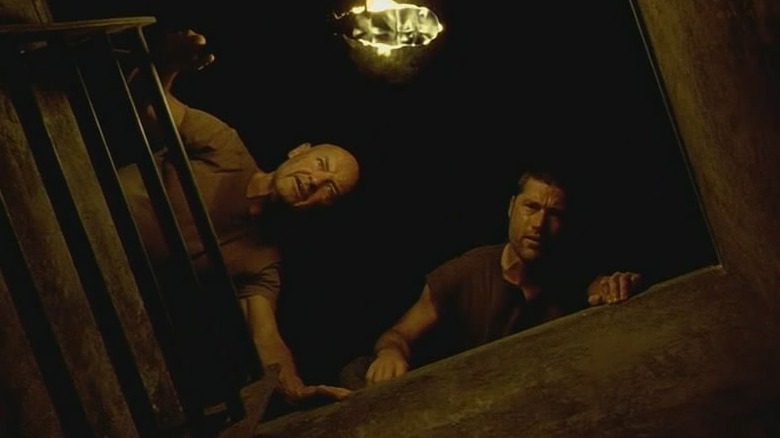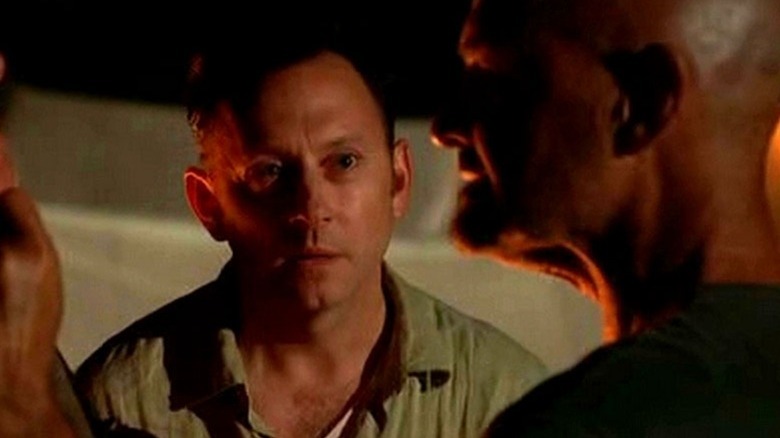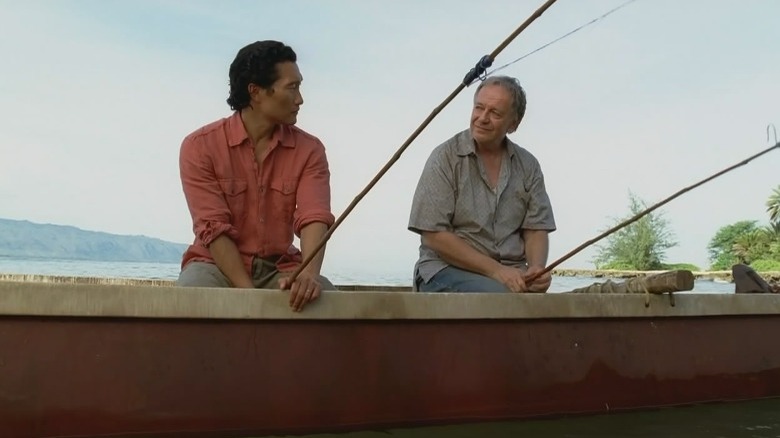Damon Lindelof Never Intended For Lost To Go As Long As It Did
Part of what makes the modern classic ABC sci-fi mystery drama "Lost" so unclassifiable is its resistance to genre categorization. Because the show was a network drama in the early 2000s, its early seasons ran over 20 episodes, and even its shorter back half seasons went fairly long too. Those viewers who are used to the modern HBO/Netflix/streamer-of-your-choice model of rarely hitting 10 episodes for a season of genre television may be overwhelmed by the embarrassment of riches promised by a season of "Lost."
For a show about plane crash survivors on a magical island, it often found intriguing detours and tangents, using a flashback device to tell new stories about a given character's past, with some striking a comedic tone, some scary, some deeply tragic. By the middle of the show's third season, in fact, that device was becoming a burden – even co-showrunner Damon Lindelof was getting bothered by the need to have new flashbacks every episode.
At six seasons, the show went on long, but just long enough that its occasional dry periods never threatened to overwhelm the whole enterprise. When a given plot arc was dragging on for episodes, you could usually count on episodes about con man Sawyer (Josh Holloway) or true believer John Locke (Terry O'Quinn) to add some heat. Still, as Lindelof would come to note, that was probably a bit too long for a show with what seemed to be a clear endgame. In many ways, the need to keep a successful show going superseded the need to tell the story as tightly as possible.x
The ending agreement
While "Lost" was a show about the survivors of a plane crash building new lives for themselves on a magical, possibly hostile island, it was very rarely a show concerned with the possibility of rescue. After the first season, in fact, there's much bigger fish to fry than whether or not the survivors will make it off the island.
Like the DHARMA Initiative Swan Station that requires a button to be pressed every 108 minutes to prevent the seeming end of the world. Or the so-called "Others," the people who resided on the island before the plane crash with a special interest in pregnancy. By the time some survivors actually make contact with the outside world at the end of season 3, whole novels' worth of mysteries and mythology have been unearthed, all of which gave the show a reputation for being extremely confusing.
That final stretch of the show's third season, in which Jack (Matthew Fox) successfully defeats Others leader Ben Linus (Michael Emerson) and initiates communication with a freighter just outside the island, is surprisingly propulsive. Given that that third season started off with wheel-spinning story arcs involving many of the main characters stuck in cages and newly introduced survivors trying to find their lost jewels, seeing the plot actually move made a huge impact.
That shift in pace, which the show would keep until its end three seasons later, was owed to one major agreement reached during season three: the show's sixth season would be its last. This was a fairly unprecedented move for a network series. But co-showrunner Damon Lindelof had hoped for an early ending since the show's beginning.
The cost of success
While Damon Lindelof was established as a television writer working on network shows like "Nash Bridges" or "Crossing Jordan," his work post-"Lost" suggests that he really is invested in telling stories quickly and efficiently. You couldn't accuse HBO series like "The Leftovers" or "Watchmen" of dragging across the finish line. Compared to those shows, "Lost" came out to a mammoth 121 episodes.
But "Lost" walked a middle ground. When it embraced the sprawl of network television, it could drag during some larger story arcs but shine when standalone episodes highlighted more marginal characters. Once its second half kicked off, the show lost that expansive feeling, building more narrative momentum at the expense of its fun detours. According to IndieWire, Lindelof's primary regret with the show was that it couldn't kick off that mode sooner.
From the very beginning, Lindelof had a notion of designing the show with "a finite beginning, middle, and end" that would ensure the overarching series tied up plot threads in a timely and satisfying manner. Before the show's pilot premiered, when all the show amounted to was ABC's initial order of thirteen episodes, that might have been a possibility. But the pilot's premiere saw 18.5 million viewers, what Variety would call "socko numbers," making the show an instant success.
Before the premiere, Lindelof assumed the show would burn bright and end quickly, a bit like cult classic "Twin Peaks." After the pilot, that would be impossible, and the business needs of the network would clash with the creative needs of the storytellers for a large amount of the show's run. In some ways, "Twin Peaks" and "Lost" suffered from opposite problems.
Four is a magic number
IndieWire quotes "Lost" co-showrunner Damon Lindelof as saying that the show "was such a ratings hit that it became clear to me instantly that all conversations about ending the show would be over." Ending the show at six seasons was seen by Lindelof as a "compromise." Given the choice, he would have gone for four.
Four seasons of the show would likely have led to a tighter narrative, greater clarity, and less of a knotty, supernatural mythology. It also would likely have omitted some of the show's most underrated episodes, or even known classics like the time travel episodes about Desmond (Henry Ian Cusick). While many viewers wanted a strict plan for "Lost," its flexibility in the early going gave it some of its most memorable characters too. When Others leader Ben Linus was introduced as the mysterious Henry Gale, the writers hadn't planned on keeping him past a three-episode story arc. But the performance was so rich that his role was expanded according to the LA Times, and the show obtained one of its most memorable characters.
Damon Lindelof's complex, even apologetic views on "Lost" don't stop at feeling it ran too long. As he said during an interview with /Film about his Peacock series "Mrs. Davis," the network considerations of 2004 didn't allow as much space to plan a grand narrative – a producer's focus was on getting eyeballs for their show. Regardless of how one feels about the length of "Lost" or its controversial finale, there's no question it succeeded there.



